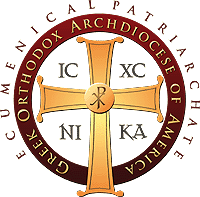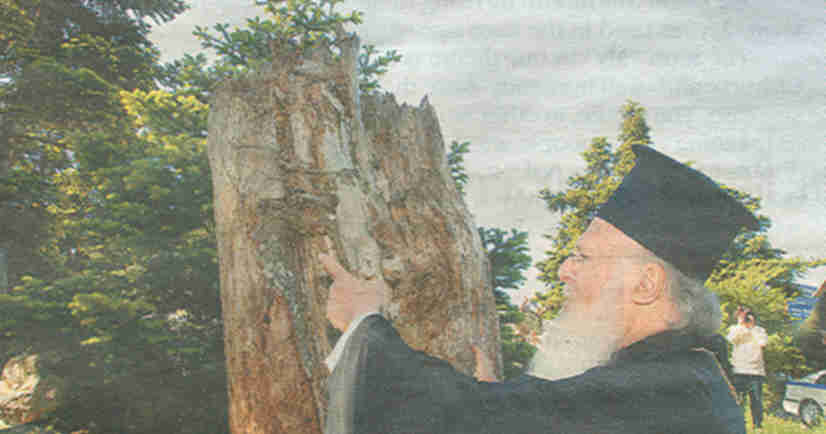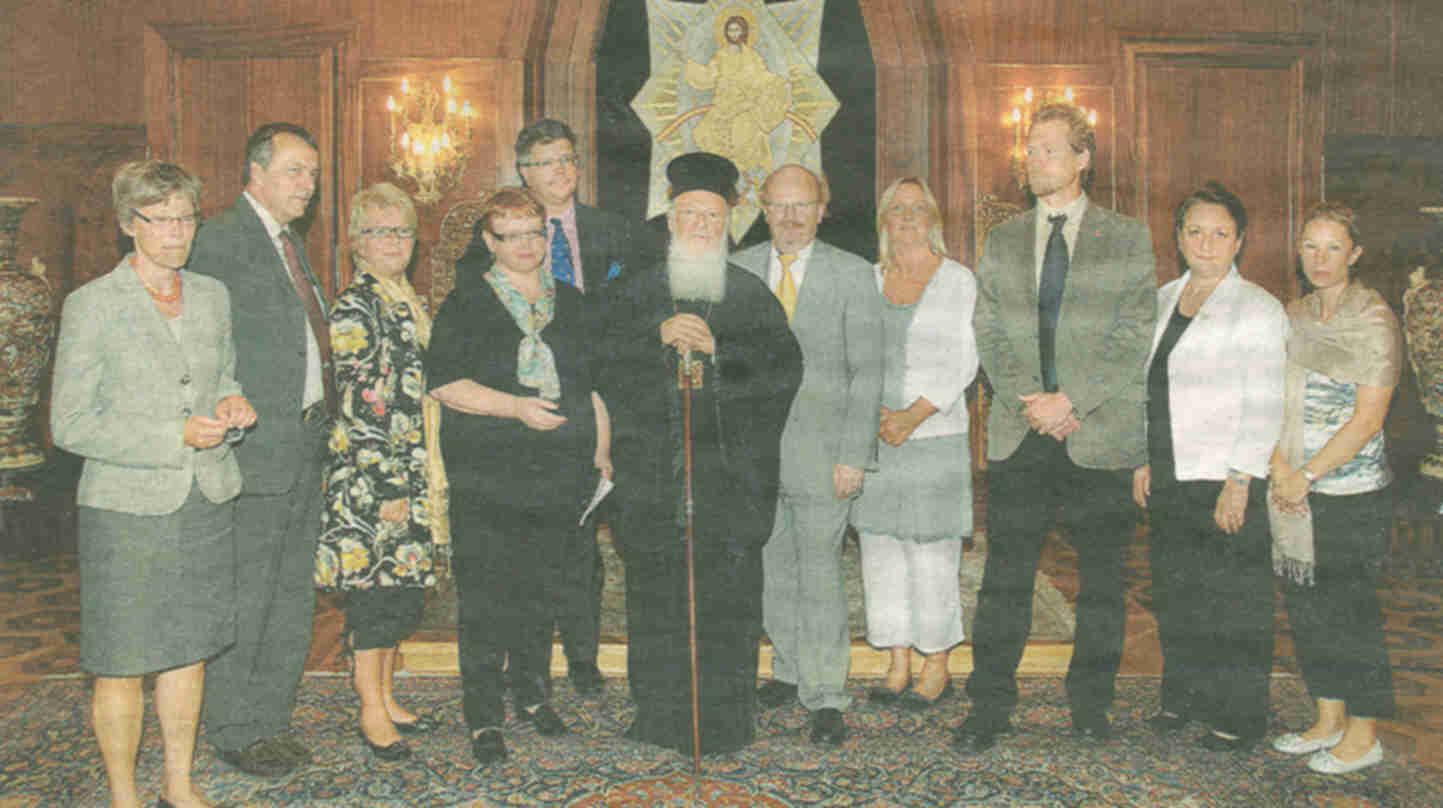 |
|
|
|
|
 |
Ecumenical Patriarch’s Encyclical on the Protection of the Environment |
For creation was made subject to vanity, not willingly, but by reason of him who subjected it... For we know that the whole creation groans and travails in pain together until now. (Rom. 8. 20, 22) Beloved Brothers and children in the Lord, Once again, as the ecclesiastical year begins, we are called to reflect - with renewed spiritual intensity in Christ and especial sensitivity - on the state of our bountiful planet, and to offer particular prayers for the protection of the whole natural world. |
 Last May's visit of the Ecumenical Patriarch Bartholomew in the mountain of Parnitha, Greece. Parnitha had suffered extensive damages from fires, which threatened the wild life of the mountain |
|
At the time, of course, this warning may have sounded exaggerated to certain skeptical ears; however, in the light of what we know now, it is abundantly clear that his words were prophetic. Today, environmental scientists expressly emphasize that the observed climate change has the potential to disrupt and destroy the entire ecosystem, which sustains not only the human species but also the entire wondrous world of animals and plants that is interdependent upon one another like a chain. The choices and actions of what is otherwise civilized modern man have led to this tragic situation, essentially comprising a moral and spiritual problem, which the divinely inspired Apostle Paul had articulated with colorful imagery in underlining its specifically onto logical dimension in his Letter to the Romans nineteen centuries ago: "For creation was made subject to vanity, not willingly, but by reason of him who subjected it ... For we know that the whole creation groans and travails in pain together until now." (Rom. 8: 20, 22) At this point, however, we are obligated to state that this spiritual and moral dimension of the environmental problem constitutes today, perhaps more so than ever before, the common conscience of all people, and especially young people, who are well aware of the fact that all of humanity has a common destiny. An increasing number of people comprehend that their overall consumption - namely, their personal involvement in the production of particular goods or their rejection of others - touches not only on ethical, but also on eschatological parameters. An increasing number of people understand that the irrational use of natural resources and the unchecked consumption of energy contribute to the reality of climate change, with consequences on the life and survival of humanity created in the image of God and is therefore tantamount to sin. An increasing number of people characterize either virtuous or else vicious those who correspondingly treat created nature either reasonably or unreasonably. Nevertheless, by the same token, even as people's awareness of the environmental crisis grows, unfortunately the image presented by our planet today is the opposite. Especially disturbing is the fact that the poorest and most vulnerable members of the human race are being affected by environmental problems which they did not create. From Australia to the Cape Horn of Africa, we learn of regions experiencing prolonged drought, which results in the desertification of formerly fertile and productive areas, where the local populations suffer from extreme hunger and thirst. From Latin America to the heart of Eurasia, we hear of melting glaciers, on which millions of people depend for water supply. Our Holy and Great Church of Christ, following in the footsteps and example of the late Ecumenical Patriarch Dimitrios, is working tirelessly to raise awareness not only among public opinion but also among responsible world leaders. It achieves this by organizing Ecological Symposia that deal with climate change and the management of water. The ultimate purpose of this endeavor is to explore the interconnectedness of the world's ecosystems and to study the way in which the phenomena of global warming and its anthropogenic effects are manifested. Through these academic gatherings, attended by representatives of various Christian Churches and world religions as well as diverse scholarly disciplines, our Ecumenical Patriarchate is striving to establish a stable and innovative alliance between religion and science, based on the fundamental principle that – in order for the goal to be achieved and for the natural environment to be preserved - both sides must show a spirit of good will, mutual respect, and cooperation. The collaboration of science and religion at these Symposia organized in different regions of the planet, seeks to contribute to the development of an environmental ethic, which must underline that the use of the world and the enjoyment of material goods must be Eucharistic, accompanied by doxology toward God; by the same token, the abuse of the world and participation therein without reference to God is sinful both before the Creator and before humanity as creation. |
|
| Beloved Brothers and children in the Lord, we know that the creation participated in the fall of Adam from the original beauty; as a result, it groans and travails in pain together. Moreover, we know that the abuse, deviation, violation and arrogance of humanity contribute to the destruction of the travailing nature, which is subjected to the corruption of creation. Finally, we also know that this destruction actually comprises self-destruction. Therefore, we invite all of you, irrespective of position and profession, to remain faithful to a natural use of all God’s creation, “offering thanks to the God, who created the world and granted everything to us.” |
 Ecumenical Patriarch Bartholomew with members of the Swedish parliment's Culture Committee delegation on its fact-finding visit. |
|
|
|
|
(Posting date 4 December 2008) HCS maintains an extensive, permanent archives including an entire section on religious news and announcements from the Archdiocese: http://www.helleniccomserve.com/archivearchdiocese.html . For more information about the Department of Religious Education or the Greek Orthodox Archdiocese of America, visit the website of the Archdiocese at http://www.goarch.org or contact the offices located at 8 East 79th Street, New York, NY 10021; (phone) 212-570-3500; (fax) 212-370-3569. The Archdiocese falls under the ecclesiastical jursdiction of the Ecumenical Patriarchate of the Orthdox Church at Constantinople: http://www.patriarchate.org. |
|
|
|
|
2000 © Hellenic Communication Service, L.L.C. All Rights Reserved.
http://www.HellenicComServe.com |
|
